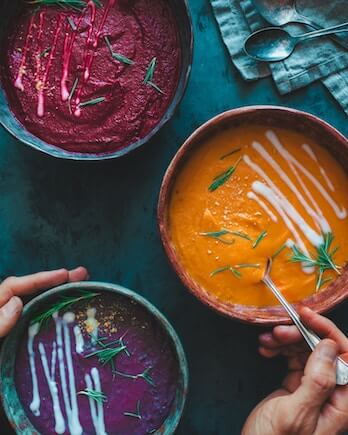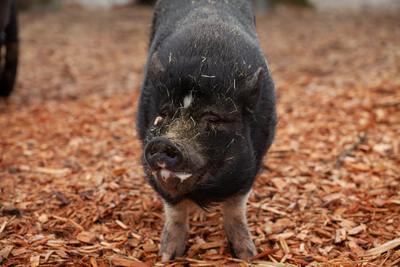
Vegetarian 101
Whether you are new to the concept of becoming a vegetarian, curious about the benefits of plant-based diet, doing research, or if you are already a long-time veghead - and for whatever reason be it for the sake of your health, animal rights, or the environment, etc... welcome to HappyCow! Here you will find articles on a wide range of topics relevant to a vegetarian lifestyle, including nutrition, veganism, animal welfare, and more.
Are you thinking about making the transition to a vegetarian or vegan diet? If so, that's good news. With more and more emerging research supporting the benefits of a plant-based diet, along with fast growing demands (and websites like HappyCow that leads one to vegetarian restaurants and health food stores), it is easier than ever to become a vegetarian.
Stereotypes project that vegetarians and vegans only eat lettuce and a few vegetables and that their diets are boring. But the standard American diet, which used to make once healthy populations now obese and unhealthy, almost always consists of mainly just flesh meat and processed junk food.
Just because non vegetarians gorge on the flesh of cows, pigs, chickens, turkeys, lamb, fish, and animals does not qualify their diet as "varied" or balanced. In fact, it's the very opposite that rings true!
When you speak with most vegetarians and vegans, they will tell you that since becoming vegetarians, they have become more open to food variety and have discovered a cornucopia of wholesome and delicious food options.
There are vegetarians and there are vegans
A vegetarian diet consists of mostly plant-based foods and no animal flesh. Some vegetarians consume eggs and/or dairy while others do not. A vegan diet, the most strict form of vegetarian, eliminates all animal products and animal by products. But do not think that vegans are deprived. On the contrary, vegans have access to everything they want to eat, only their foods are made without animal products - from ice cream, cake, cookies, pastries and gravy to mock "meats" that taste so much like the real thing. While the vegan versions of favorite foods are just as delicious, if not more, they contain no cholesterol and almost no saturated fat or none at all! It's a win-win situation. If there are the same tasty food options available that involve no cruelty to animals, that are healthier, and the producing of them is gentle on the environment, why not choose the more healthy, beneficial choice?
There is a stereotype that vegetarians and vegans are "hippie wannabes", but consider that those very people who subscribe to such stereotype actually admire many vegans and vegetarians without even knowing it! You don't see Pamela Anderson, Brad Pitt, Christie Brinkley, Penelope Cruz, Josh Hartnett, Natalie Portman, Alicia Silverstone, and many celebrity vegetarians wearing hemp and tie-dye, brightly colored bandanas and flowers while shouting, "Free love!" and lighting up a joint. The reality is that many of today's top professionals, doctors, celebrities, along with revered minds of the past including Shakespeare, Leonardo Da Vinci, Ghandi, Buddha believed in eating plant-based diets that do not harm living creatures... even Albert Einstein and Jesus Christ. See list of HappyCow's list of famous vegetarians.
How does one get enough protein as a vegetarian?
The "but you need more protein" issue is a myth - it is a false argument. It is based on a far outdated experiment conducted in the early 1900s on rats. Many current medical studies are showing that too much protein, in fact, especially from animal protein, is the problem. Too much animal protein can impair the kidneys as well as leach calcium, zinc, B vitamins, iron and magnesium from our bodies. Studies have also correlated too much protein with osteoporosis, heart disease, cancer, and obesity. We've all heard the saying, "Everything in moderation." The thing is, an overly excessive amount of protein in the human body is detrimental to health.
Although too much protein is bad, our body needs some amounts of it. Protein is deemed as "the building blocks of life," and everything has protein in it in varying amounts. A varying diet consisting of vegetables, fruits, beans, grains, and legumes provides more than adequate amounts of protein - only without the added cholesterol and saturated fats, antibiotics, chemicals, steroids, sulfuric substances, etc., found in animal sources.
The best way to eat, for me, is to consider which food will give me more nutrition per calorie, ie. the most nutritional bang for my caloric buck. This is one of the reasons I, along with vegetarians I know, stay trim and healthy. One hundred calories of cow meat is tiny, but one hundred calories of broccoli is a huge amount of broccoli. Besides, anything you think you might be getting from eating flesh meat is only "second-hand." Where does the cow get its protein? Like babies who feed on their mothers' milk, getting the nutrients from the milk that their mother already consumed, people who eat animals are only getting the nutrients, second-hand, that the animal already consumed. Personally, I'd rather get first-hand quality where my health is concerned. A good book that delves into thirty years of studies where animal protein is concerned (including milk) is The China Study by T. Colin Campbell, PhD.
Read more on: vegetarian protein
What about calcium? Do I need dairy for strong bones?
NO, you do not need animal dairy for calcium or anything. This idea is perpetrated by an extremely aggressive advertising program paid for by the dairy industry that is not based on good science. It is a money-making scheme. Milk contains animal protein, and thus contributes to the host of illnesses listed above. Studies have shown that people in countries that consume milk routinely tend to have weaker bones than those in countries that avoid milk. Osteoporosis have been correlated to an excess of protein in the diet along with sedentary living. Milk does NOT slow the process of osteoporosis that commonly occurs in older women. Pasteurized, processed dairy, in my opinion, is a toxic "food group". It doesn't help that it's basically all saturated fat and cholesterol. Dairy also contains antibiotics, hormones, pesticides, steroids, chemicals, and even perchlorate (that is the scientific word for rocket fuel!) Yuck! Dioxin, too, one of the most toxic substances in the world, is often found in dairy products. And how about the blood cells and pus that come in it, too, from the far overgrown mutated udders that are hooked up to painful metal machines all day to keep up with demand so that they blister and bleed? Not so appetizing.
On the other hand, a reliable source of minerals (manganese, chromium, selenium and magnesium) can be found in fruits and vegetables and in higher quantity and better quality. Fresh fruits and veggies are also high in boron, which helps lessen the loss of calcium through urine - while animal protein increases the loss of calcium through urine. Plant-based foods are abundant in first hand calcium that is more easily absorbed by the body. This includes, but is not limited to, quinoa, molasses, green leafy vegetables such as kale, collards (any kind of greens, really), broccoli, soy products, grapefruits, chickpeas, fortified grains and cereals, red beans, seeds, raw nuts, etc... Read more on: vegetarian nutrition
Going from vegetarian to vegan
It is as simple as cutting out the dairy and animal by-products. Check online or in books to see what animal by-products are. See HappyCow's list of animal ingredients
Examples of animal by-products are gelatin, glycerin (unless specified that it's from plant sources), cochineal, casein, whey, etc. Don't let your jaw drop just yet, though - it's far easier than it seems; I promise. The healthiest vegan stays almost exclusively in the fresh produce section and the bulk staples section, where one can stock up on things such as fresh seasonal fruits and vegetables, oats, rice, beans, flour, seeds, various grains, etc. There's no worry there - everything is mostly likely vegan.
It is as simple as cutting out the dairy and animal by-products. Check online or in books to see what animal by-products are. See HappyCow's list of animal ingredients
Make your meals at home. You can make cooking fun by inviting some friends over and doing it together. It can lead to a lot of laughter and interesting conversations. HappyCow and websites like Vegweb offer hundreds of vegetarian recipes to help you make yummy homemade meals. Book stores carry vegan cookbooks. And it's often easy to "veganize" your favorite recipe with substitutes.
For instance, if a baked goods recipe calls for an egg, you can use half a mashed banana, a bit of applesauce, tofu, Ener-G brand egg replacement, or blend some flax seeds with a bit of water in a blender until they are the consistency of raw egg. For milk, you can use soy milk, rice milk, almond milk, oat milk, or hemp milk. Soy milk tends to be the most commonly used replacement, and if you don't mind a little fat, Very Vanilla Silk Soymilk brand "for kids" (who says adults can't enjoy it, too?") tastes just like melted ice cream. Non-fat soymilk, such as West Soy brand non-fat, comes in vanilla or plain. You will be able to find different flavors of soymilk such as chocolate, chai, and coffee, at most major health food stores. Around the holidays, Silk brand offers a soy nog that tastes very much like eggnog.
For butter, you can use vegetable margarine or oils; I find that dishes taste the same without that added butter fat. Cheese cake? No problem. Toffutti brand makes a vegan-style cream "cheese" that produces cheesecakes that taste just like the dairy version. Tacos? There's always the option of beans and lentils, but if you want that meaty flavor and texture, TVP (textures vegetable protein) is the way to go. TVP has a meaty texture. Add some sauce, and it is a surefire way to make your meat-eating friends believe they are eating beef in their tacos! If friends know you as a strict vegan, you could really have some fun with this.
You will be able to find substitutes for any kind of meat to make the dish that you want to make. There are substitutes for burger patties, ground beef, chicken (nuggets, slices, patties, strips, etc), turkey, deli slices, hot dogs, fish, shrimp, etc... Yes, vegans have it all. By reading the ingredient labels carefully, you will be able to determine which meat substitutes are vegetarian, and which are vegan. The non-vegan ones might contain egg and some kind of dairy (as in casein and whey). And then there is tofu, the ultimate vege "meat". Tofu soaks up the flavors in a dish, and is highly versatile; you can even make delicious pudding with it.
And, yes, there are also vegan versions of cheese, whipped cream, frosting, gravy. . .you name it. Try chocolate without the milk added in chocolate bars, baking chocolate chips, and hot cocoa. Even vegan ice cream comes in several brands and an assortment of flavors. Try the Toffutti Cutie brand of ice cream sandwich!
How about snack foods?
Well, you certainly don't have to give up that habit. You really don't have to "give up" anything when you become a vegetarian or vegan. There are vegan versions of almost everything available. Most potato chips and tortilla chips, unless made with some kind of cheese or dairy derivative, tend to be vegan. Check the labels.
Most health food stores and markets sell everything I've mentioned (and then some). Natural foods markets are a blessing for vegetarian and vegans. You will see aisles upon aisles, shelves upon shelves, of veggie friendly products. If you want to know what is vegan in the conventional grocery stores, log onto: www.peta.org/living/vegetarian-living/accidentally-vegan.aspx. The site page supplies an extensive list of what is vegan.
Don't like the taste of vegetables?
Vegetables are the most nutrient-dense foods. They are essential in any healthy diet. It's usually in the spicing - it's hard to believe anyone could take a taste of Indian vegetable dishes or Middle Easter vegetable dishes and hate the taste. Their cuisine is among the most delicious in the world. But, if that doesn't work, an awesome method to get some vegetables into your body is making yourself a green smoothie. What you do is you mix vegetables in a blender with fruit, and the taste of fruit overrides the taste of the vegetables and it no longer tastes so "vegetabley." You can be creative and do any amount of combinations you like with this. Pineapple is especially useful because of the strong fruity taste, but any fruit really works. Just make sure you still put a good amount of green vegetables in there and you got a tasty glass of immeasurable nutrition.
My family eats out at non-vegetarian restaurants. What can I do?
If your family is adventurous, you could suggest going to a vegetarian restaurant once in a while or going to a vegetarian-friendly place. Often times, meat eaters are surprised by the veggie dishes served at vegetarian restaurants. The experience might open them up to the wide variety of plant foods that are available. If your family is not open to trying pure vegetarian restaurants, then you could suggest going to a vegetarian-friendly place. Try restaurants that offer international cuisines such as Indian, Middle Eastern, Ethiopian, Greek, Thai and Chinese restaurants. Often times, you will find vegetarian dishes on the menu. You could always ask for substitutes ("no oyster sauce", etc.). Many customer friendly restaurants are willing to make substitutions whenever possible. Don't be afraid to ask. Occasionally, restaurants will make "impromptu" meals to suit your needs when requested. You could call ahead to check.
How do vegetarians deal with negative comments and such?
When you become a vegetarian or vegan, you are bound to hear negative comments made about the diet, maybe from family members or peers. The people who make comments against a vegetarian diet are almost always people who lack true knowledge about vegetarianism and health. When a person makes a baseless, negative comment in any other area of life, what do I tend to do? Ignore it because I know what s/he said isn't true. Reacting with anger only adds fuel to fire. Being pushy, preachy, or condescending in return? Two wrongs don't make a right; it only makes the ignorant less open to learning about where one stands. It's said that the best "revenge" is to succeed. When you eat a balanced vegetarian diet, you will be healthy. Be happy and healthy. Get lots of books on vegetarianism and become extensively informed on the subject. And when someone asks you about your new diet, share with them what you know. The best thing to do is to lead by a positive example.
How do vegetarians deal with negative comments and such?
When you become a vegetarian or vegan, you are bound to hear negative comments made about the diet, maybe from family members or peers. The people who make comments against a vegetarian diet are almost always people who lack true knowledge about vegetarianism and health. When a person makes a baseless, negative comment in any other area of life, what do I tend to do? Ignore it because I know what s/he said isn't true. Reacting with anger only adds fuel to fire. Being pushy, preachy, or condescending in return? Two wrongs don't make a right; it only makes the ignorant less open to learning about where one stands. It's said that the best "revenge" is to succeed. When you eat a balanced vegetarian diet, you will be healthy. Be happy and healthy. Get lots of books on vegetarianism and become extensively informed on the subject. And when someone asks you about your new diet, share with them what you know. The best thing to do is to lead by a positive example.
What about holiday meals?
Large natural foods markets usually will offer special holiday meals for vegetarians and vegans - or ask them to! Browse the frozen section at the health food stores, for vege turkey and vege ham products if that's what you need. Try Tofurkey, a vege turkey with stuffing. Or make something yourself. In fact, whip something up extra delicious to make an extra good impression.
Can vegetarians eat animal crackers?
Yes. There are even vegan versions. Barbara's Bakery brand makes 'em. Visit Jacklyn Hopper's blog.
Article edited by HappyCow.Net
Ask questions, offer answers: Vegetarian Forum
Take Action Eliminate animal ingredients from your diet, Animal ingredients A-ZDisclaimer: The views expressed in articles published on HappyCow are those of the authors alone. They do not represent the views or opinions of HappyCow nor its staff.
Some links in this article are possibly part of Amazon's affiliate program, so when you make a purchase a small amount will go to support the HappyCow website.
This information is not intended to replace the diagnosis, treatment and services of a physician. Any recommendations and indications are at the user's discretion. For severe or life-threatening conditions, always seek immediate medical attention. While we work to ensure that product information is correct, and list only products containing vegetarian ingredients, on occasion manufacturers may alter their ingredient lists. Actual product packaging and materials may contain more and/or different information than that shown on our Web site. We recommend that you do not solely rely on the information presented and that you always read labels, warnings, and directions before using or consuming a product. For additional information about a product, please contact the manufacturer. HappyCow assumes no liability for inaccuracies or misstatements about products.




